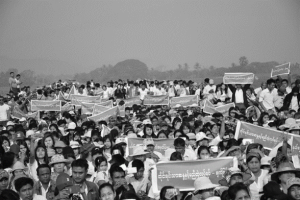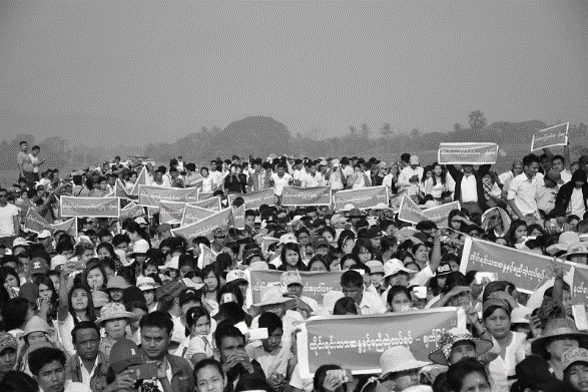As the National League for Democracy (NLD)-led government prepares for another round of historic peace talks later this month, ethnic Mon leaders are planning the second protest in as many weeks over the party’s policies. But the anger simmering in the state has nothing to do with disarmament, profit-sharing or other intractable issues of multiparty peace negotiations. No, the thing that the NLD has done to upset a broad swath of the Mon people is to name a bridge.
NLD is spending precious political capital to impose the name General Aung San on a new bridge connecting the Mon State capital Mawlamyine to Bilukyun Island. Despite broad opposition in the state, including protests at the bridge, NLD members of parliament voted overwhelmingly this week for the new name. Mon activists plan to hold another protest on Sunday, and say they will continue to fight until the name is dropped.

In many ways, the bridge conflict is not even about the name. Underlying the fight is a test of the NLD’s campaign promise to be responsive to the demands of its constituents, especially those from minority ethnic groups who overwhelmingly supported the party over ethno-nationalist alternatives. Many voted for the NLD out of a belief that a single, united party could challenge the military-establishment more effectively than a splintered ethnic coalition. The NLD promised to spend its energy reforming the country rather than squabbling for power.
Now, though, the broad mandate that voters handed the NLD in 2015 seems to have made the party complacent. How else can one understand the bridge vote? To begin with, there is no lack of civil infrastructure in Myanmar, also known as Burma, named for General Aung San. Practically every town in the country has an Aung San or Bogyoke (major general) street running through it, often anchored at one end by a statue of the general gazing out over traffic. Furthermore, NLD has little to gain by identifying with General Aung San; the party is led by his enormously popular daughter, Daw Aung San Suu Kyi. NLD already has a monopoly on legitimacy-by-association and one more bridge will not change that.
The complete lack of even passable rationalizations is insulting to Mon observers, for whom the issue feels immediate. They have been clear that they are not trying to attack the memory of General Aung San, but say that in a country dominated by majority Burman institutions, they want their culture represented too. The bridge’s name, they argue, should reflect the Mon character of the area, and the people who will use the bridge.
As the standard-bearers of Myanmar’s pro-democracy movement, NLD enjoys enormous support throughout the country. But it risks going the way of other post-colonial freedom-fighting parties like the Indian and African National Congresses, both of which continue to ride the legacies of their great leaders (Mahatma Gandhi and Nelson Mandela), while offering little in the way of meaningful governance.
In Myanmar other minority ethnic groups are taking note of the move, and several plan to send representatives to upcoming protests. And while the NLD will not lose its national credibility to the bridge controversy overnight, similarly tone-deaf decisions around the country will cost them votes and allies in future, important fights. In a country like Myanmar where ethnic identity runs so deep, ethnic political parties are ready to pick up disaffected NLD voters. Even the enormously unpopular Union Solidarity and Development Party (USDP), considered a lackey of the establishment, has sought to exploit the issue by strongly denouncing the vote in parliament. For the NLD, the work of reforming the country is enormous, and wasting political capital on pyrrhic, symbolic fights is deeply irresponsible.
To be clear, even with a majority in parliament, NLD is in a very difficult position. Many of the politically unpopular decisions it makes spring from its tenuous and limited power, and it must make calculations about conceding some fights to win others. But it is in cases like the bridge fight—with nothing to be gained and much to be lost—that NLD must show voters it is listening. If they do not, it is very likely another party will.

